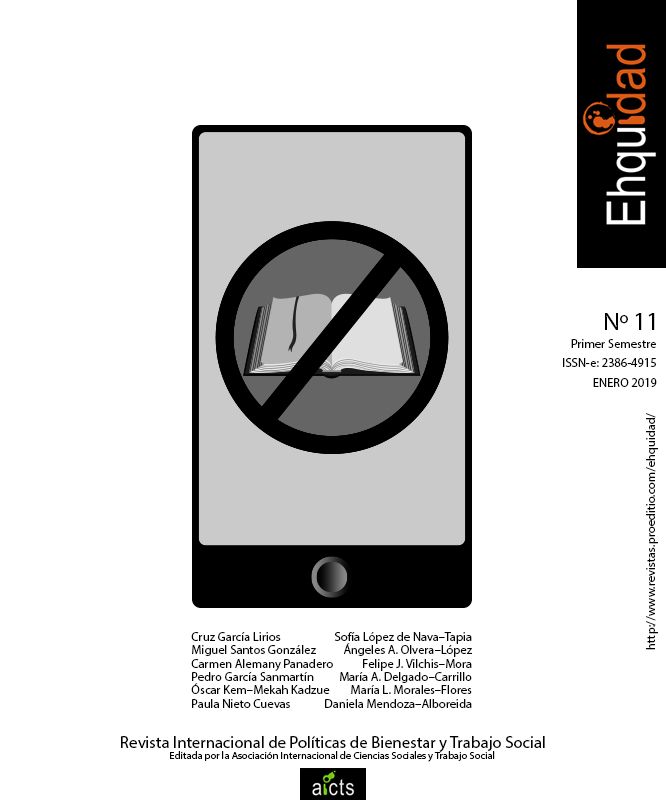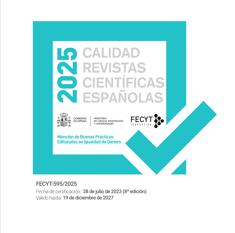Specified model based on meanings related to climate and the institutional norm of workers in a health center in Mexico
DOI:
https://doi.org/10.15257/ehquidad.2019.0001Keywords:
Health, Model, Contrast, Disease, AdhesionAbstract
Often the public administration of health services implements strategies to approach the needs of users through the promotion of lifestyles avoiding accidents and illnesses, but these are only part of an awareness program rather than a consensual policy. of diffusion of self-care. In this sense, the objective of the article was to delimit a model for the study of climate and institutional norms, factors that the literature identifies as determinants of satisfaction, carrying out an exploratory investigation with an intentional selection of professional health informants in a community of the State of Mexico. From the interpretation of meanings around the institutional variables, an instrument was established to establish the reliability and validity, as well as the contrast of the specified model in which a significant association was found between two institutional factors, but when explaining only 38% suggest the inclusion of other variables related to tasks, innovations, supports and family principles.Downloads
References
Abbasi, A., Rafique, M., Aziz, W. y Hussai, W. (2013). Human immunodeficiency virus / acquired immune deficiency syndrome (HIV/AIDS): Knowledge, attitudes of university students of the state of
Azad Kashmir (Pakistan). Journal of AIDS & HIV Research, 5, 157-162
Becerra, V., Chunga, N., Palomino, C., Arévalo, T., Nivin, J., Portocarrero, L., Carbajal, P., Tomás, B., Caro, M., Astocaza, L., Torres, L., Carbajal, E., Pinto, A., Moras, M., Munayco, M. y Gutiérrez, C. (2012). Asociación entre conocimiento de mujeres peruanas hacia VIH y sus actitudes frente a personas infectadas. Revista Peruana de Epidemiología, 16, 1-8
Carreón, J., Hernández, J., Bustos, J. M. y García, C. (2017). Confiabilidad y validez de un instrumento que mide el compromiso de trabajadoras sociales en instituciones de asistencia sanitaria. Encrucijada, 26, 69-86
Cobos, D., Morón, J., López, E. y Reyes, E. (2013). Un estudio cualitativo sobre percepción y actitudes de estudiantes y profesorado en chontales. Población y Salud en Mesoamérica, 2, 1-21
Davis, M., Shell, A. y King, S. (2012). Assessing pharmacist’ perspectives of HIV and the care of HIV–infected patients in Alabama. Pharmacy Practice, 10, 188-193
García, C. (2013). Actitud de trabajadores sociales hacia portadores del Virus de Inmunodeficiencia Humana en centros de salud. Salud & Sociedad, 4, 60-68
García, C. (2017). Política de salud comunitaria y la adhesión al tratamiento del cáncer cervical en una comunidad del centro de México. Epsys, 21, 1-6
García, C., Carreón, j. y Hernández, J. (2017). Límites de los modelos de salud ocupacional. Estudio de adhesión al tratamiento de asma en trabajadores adultos mayores migrantes del estado de México. Visión gerencial, 16 (1), 103-118
Petro, B. (2013). Attitudes and views of teachers towards student sexual relationships in secondary school in Tanzania. Academic Research International, 4, 232-241
Rice, R., Wu, Z., Li, L., Detels, R. y Rotheram, M. (2012). Reducing STD/HIV stigmatizen attitudes through community popular opinion leaders in chinese markets. Human Communication research, 38, 379-405
Selesho, J. y Modise, A. (2012). Strategy (ies) in daling with HIV / AIDS in ours schools: changing the lenses. Journal of Human Ecology, 38, 181-189
Solat, S., Velhal, G., Mahajan, H., Rao, A. y Sharma, B. (2012). Assesment of knowledge and attitude of rural population about HIV/AIDS in Raigad Distrit, India. Journal of Dental and Medical Science. 1, 31-45
Uribe, A. y Orcasita, L. (2011). Evaluación de conocimientos, actitudes, susceptibilidad y autoeficacia frente al VIH / SIDA en profesionales de salud. Avances de Enfermería. 29, 271-284
Valdés, O., Vilchis, F. J., Bautista, M., García, C. y Castro, A. (2017). Adhesión al tratamiento de insuficiencia renal crónica en una comunidad del estado de México. Margen, 84, 1-8












